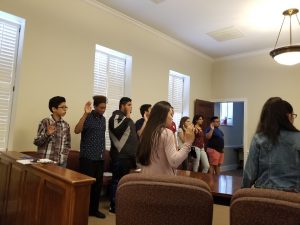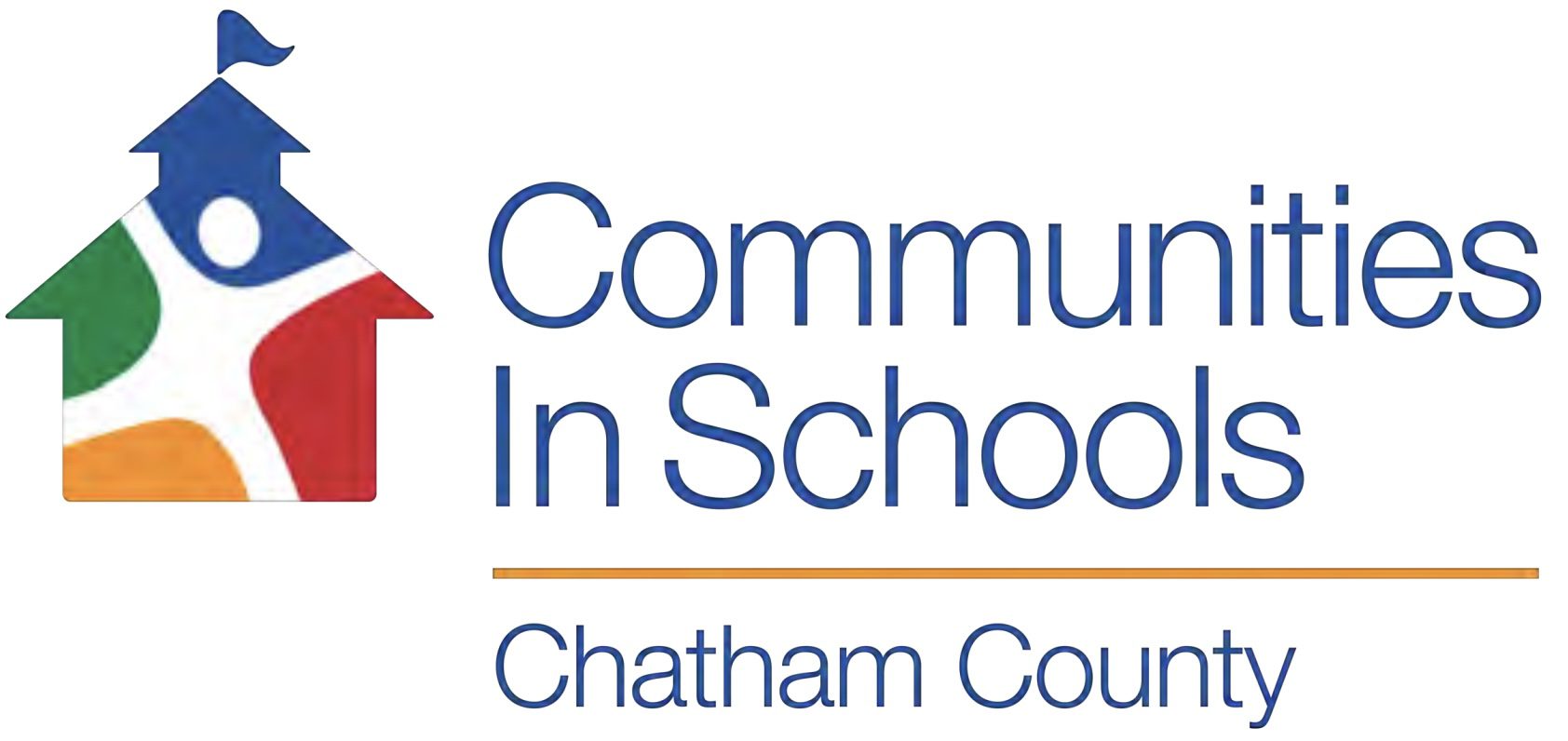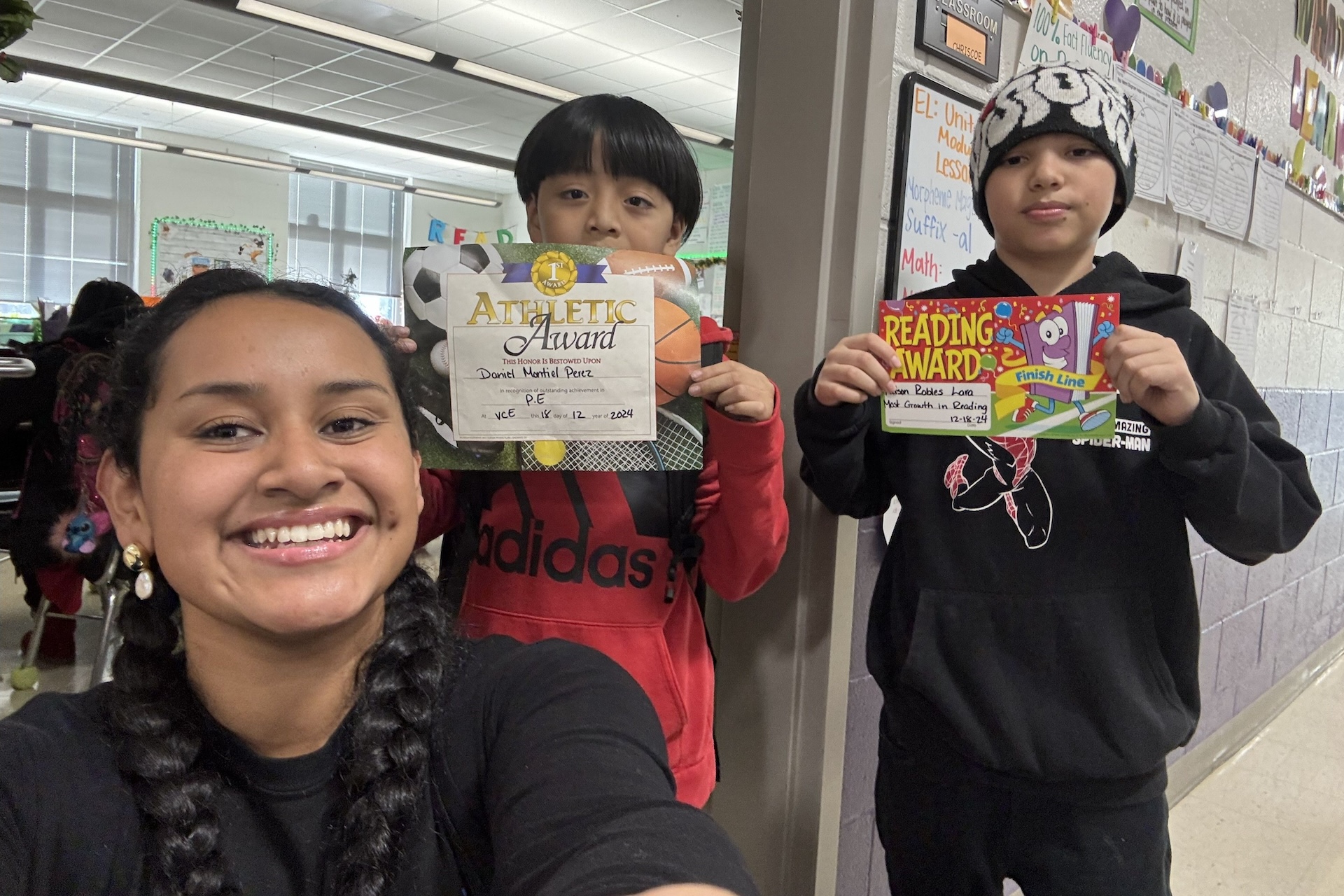
The courtroom was silent, except for some shuffling papers and nervous whispers. Eyes locked on the judge: “Would the defendant please stand and face the jury. Now, if the Foreperson would please read the sentence of the jury.” Eyes shifted to the Foreperson as he stood and read the verdict: “Four hours of jury duty; Fifteen hours of community service; One self-advocacy seminar, and a mediation session with the victim.” “Do you understand your sentence?” asked the judge, and, “Do you agree to complete this sentence?” “Yes,” said the defendant. The judge then explained that if this had been traditional district court, s(he) could have received up to 60 days in a juvenile justice facility for committing a Class 2 Misdemeanor.
This wasn’t, however, district court; this was Teen Court. Run by Communities In Schools of Chatham County (CISCC), Teen Court is managed by program coordinator Jeremiah McCaffity and program assistant Bieisy Santiago, who also coordinate CISCC’s Community Service & Restitution program. Teen Court is a key element of juvenile diversion, an intervention strategy that redirects youths away from formal processing in the juvenile justice system, while still holding them accountable for their actions. Teen Court accepts referrals of first-time offenders ages 11-17 who have admitted guilt to misdemeanor offenses such as assault, affray, underage possession/consumption of drugs, alcohol and or drug paraphernalia, vandalism, disorderly conduct, and larceny/shoplifting. Cases are referred by law enforcement, school resource officers, judges and court counselors.
Sessions in Teen Court are structured to resemble traditional district court as much as possible. Sessions are held each month during the school year, and the location alternates between the Siler City courtroom at City Hall and the historic Chatham County Courthouse in Pittsboro. An adult judge presides over court proceedings, and an armed deputy serves as the bailiff. Jeremiah and Bieisy provide supervision in the deliberation room, but everything else is conducted by the youth. The trained student volunteers take on the roles of attorneys, jurors, and clerk of court. The attorneys present the facts of the case, the defendant makes a statement, student jurors question the defendant and the defendant’s family (if applicable), and the jury deliberates until a consensus is made about a constructive sentence that benefits the defendant and the community. At a recent session, student juror ‘Ray’ asked the defendant thoughtful questions such as, “What are your hobbies? Do you have any friends you can talk to? Have you ever thought about seeing a professional to help you with your negative view of yourself?” The youth take their positions seriously, because they know that what they say and what they ask directly affect the defendant.
Teen Court is powerful and effective. According to Paul Bauer, a retired chemical engineer who has been volunteering with the Teen Court program for over three years, the peer jurors make a big impact on the defendants in a way that adults aren’t able to. The jury members are teens too, and they understand first-hand the environments, pressures, and temptations the defendants face. Also, many of the jurors have been defendants themselves and are fulfilling their jury duty as part of their sentences. ‘Sandra’ is one of those jurors. ‘Sandra’ is a sophomore at Jordan Matthews High School who recently participated in her first session volunteering as a Teen Court jury member. ‘Sandra’ was positive, polished, showed empathy when questioning the defendant, and was especially engaged in the deliberation process. She says, “You really learn no matter what side you are on. You’ve been a defendant and you learn from your mistake. You’re nervous at first, going into a real courtroom.” By having been a defendant already, she feels that it is easier to know what questions to ask that will get to the root of the issues that will lead to an appropriate verdict.
As a long-time volunteer, Bauer helped develop the extensive training module for the student attorneys, and he currently serves as the lead judge for Teen Court. He is proud of all of the teen volunteers and has seen them mature as they take on new roles. The volunteers are middle and high schoolers from all parts of the county, representing all races and socio-economic levels. During deliberation, the jurors determine the facts of the case, discuss their personal conclusions, listen to other points of view, and reach a consensus. They learn to work as a team since all judgments must be unanimous. The volunteers are exposed to real-life events containing sensitive information. They treat the defendants with respect and sincerely listen to what they have to say about their offense, their home life, and plans for the future. Bauer says that “leaders develop in the jury room.” ‘Justin,’ a junior at Jordan Matthews, has been associated with Teen Court for three years, and currently knocks it out of the park as a prosecuting attorney. ‘Justin’ says that working with Teen Court has opened him up to many experiences including interacting with people he wouldn’t typically interact with. He feels that Teen Court is beneficial to the community in a variety of ways. After the sentencing, defendants have closer ties to the local community, there is less recidivism, and Teen Court is much less expensive to operate than traditional court. ‘Justin’ said, “Juvenile Detention Centers are the ‘end of the line’ and at Teen Court, youth get a second chance.”
We all make mistakes, and Teen Court provides youth an opportunity to learn from their mistakes as they develop positive life skills. Some skills are learned as they take the other side as jury members. Other skills are developed through working their community service hours, educational seminars, and additional sanctions. Jeremiah works hard to ensure that the experience of completing a sentence is restorative instead of punitive. He is always looking for new ways to partner with the community and offer high-quality evidence-based educational seminars that will serve our youth well. Teen Court has volunteers that set examples for their peers, helping them understand there are positive alternatives to the choices that have led them down their current path. All involved are learning skills that they can apply now as well as take with them as these youth mature into contributing members of their communities and of society at large.
For more information on any aspect of the Teen Court Program, including ideas on new and expanded educational seminars, please contact Jeremiah McCaffity at: jmccaffity@cischatham.org or (919) 663-0116 ext.406

